EDUNEWS & VIEWS
Indian Health Minister Inaugurates New Campus of S-VYASA University
The newly inaugurated campus is designed to offer specialized programs in Engineering, Computer Applications, and Management, all while incorporating Yoga and holistic development into the curriculum
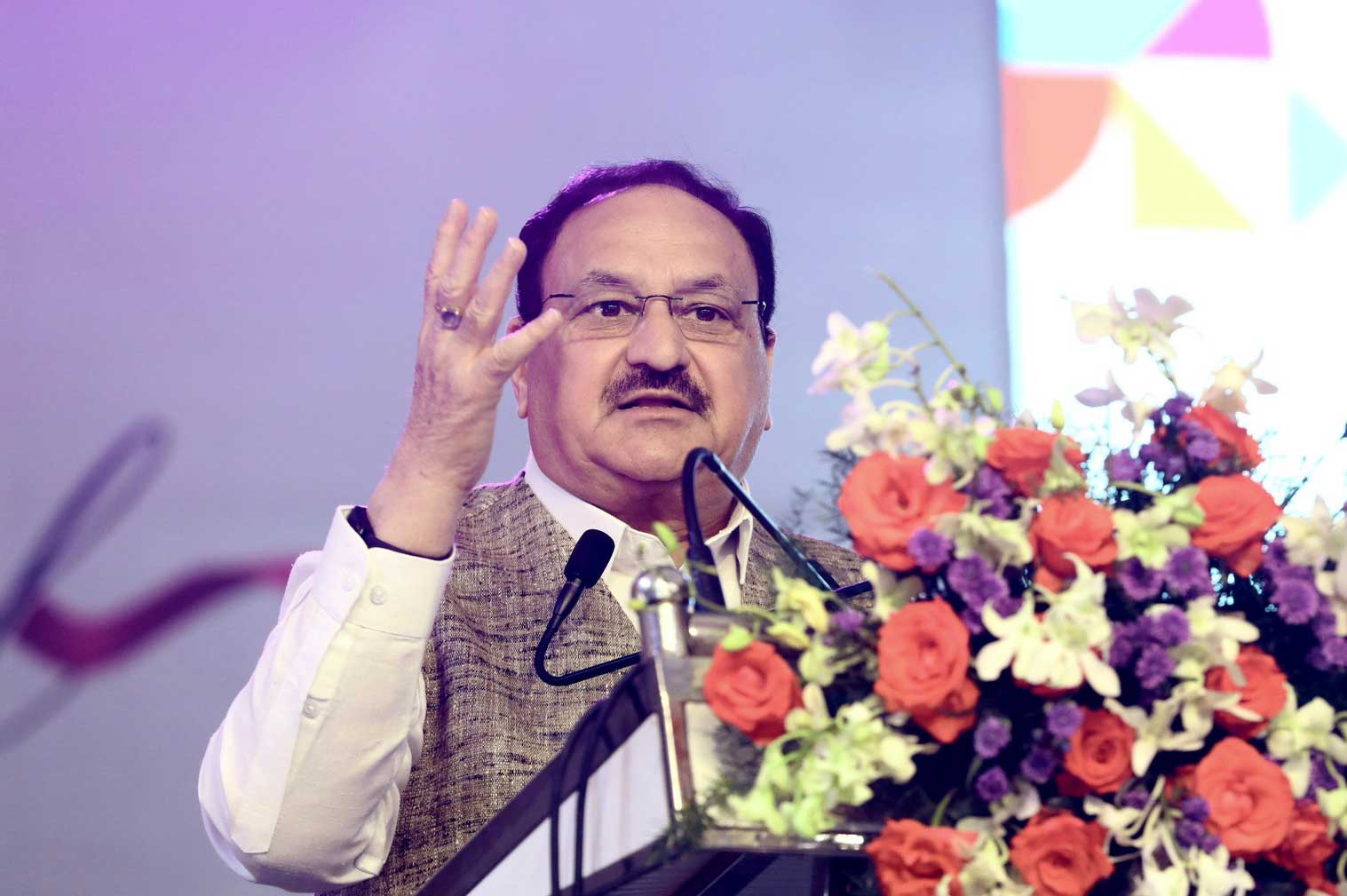
India Health Minister J P Nadda on Friday inaugurated the new campus of the School of Advanced Studies, S-VYASA University, an institution dedicated to advancing traditional Indian knowledge systems alongside modern education. The new campus is located in Bengaluru, the capital city of South Indian state Karnataka, and a celebrated technology hub. The Minister also launched two significant initiatives—DIGI-Vyasa and Vyasa TV.
S-VYASA, a deemed to be university, is renowned for its emphasis on integrating holistic wellness with academic excellence. The institution focuses on areas such as Yoga, Naturopathy, and Ayurveda, offering an education model that blends ancient practices with modern scientific approaches. The newly inaugurated campus is designed to offer specialized programs in Engineering, Computer Applications, and Management, all while incorporating Yoga and holistic development into the curriculum.
Speaking at the event, Nadda highlighted the government’s commitment to a more integrated healthcare system. “Our visionary Prime Minister Narendra Modi has brought about a significant policy shift in healthcare to ensure that the health system is both holistic and comprehensive,” Nadda said. He further emphasized that efforts are underway to merge the AYUSH (Ayurveda, Yoga, Unani, Siddha, and Homeopathy) system with modern medicine for better healthcare outcomes.
The Minister also pointed to the country’s growing healthcare infrastructure, noting that India now boasts 22 All India Institutes of Medical Sciences (AIIMS), each with an AYUSH block. “A collaborative approach has been adopted, where modern medicine practitioners refer patients to AYUSH treatments when deemed beneficial, and vice versa,” he explained, underscoring the synergy between both systems for enhanced patient care.
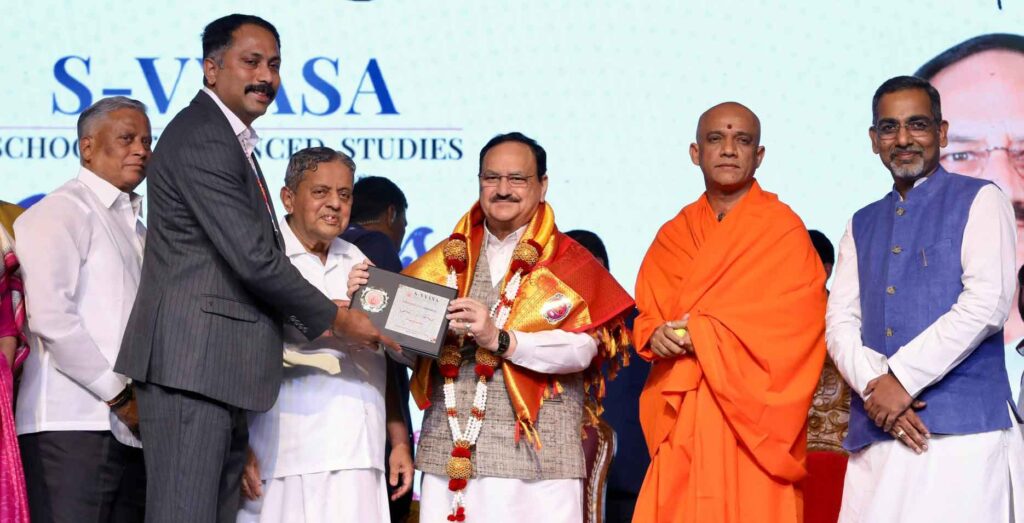
Nadda also drew attention to the Ministry of AYUSH’s international collaborations, which now span 103 countries. He further highlighted the establishment of the WHO-recognized Global Traditional Medicine Centre in Jamnagar, Gujarat. This center is set to become the world’s leading hub for traditional medicine studies and innovations, he added.
The launch of the new S-VYASA campus and its initiatives reflects a continued push toward modernizing education while staying rooted in India’s rich cultural heritage. The institution’s tagline, “Education Meets Industry,” emphasizes its mission to bridge the gap between academia and real-world applications, fostering a transformative learning environment for its students.
The new campus is expected to be a hub for cutting-edge education, industry collaboration, and technological innovation, making it a vital part of India’s growing landscape of holistic education and healthcare.
EDUNEWS & VIEWS
Teacher Strength in India Crosses One Crore for the First Time
India’s teacher count crosses one crore in 2024-25, improving pupil-teacher ratios and female participation amid changing student enrolment trends.
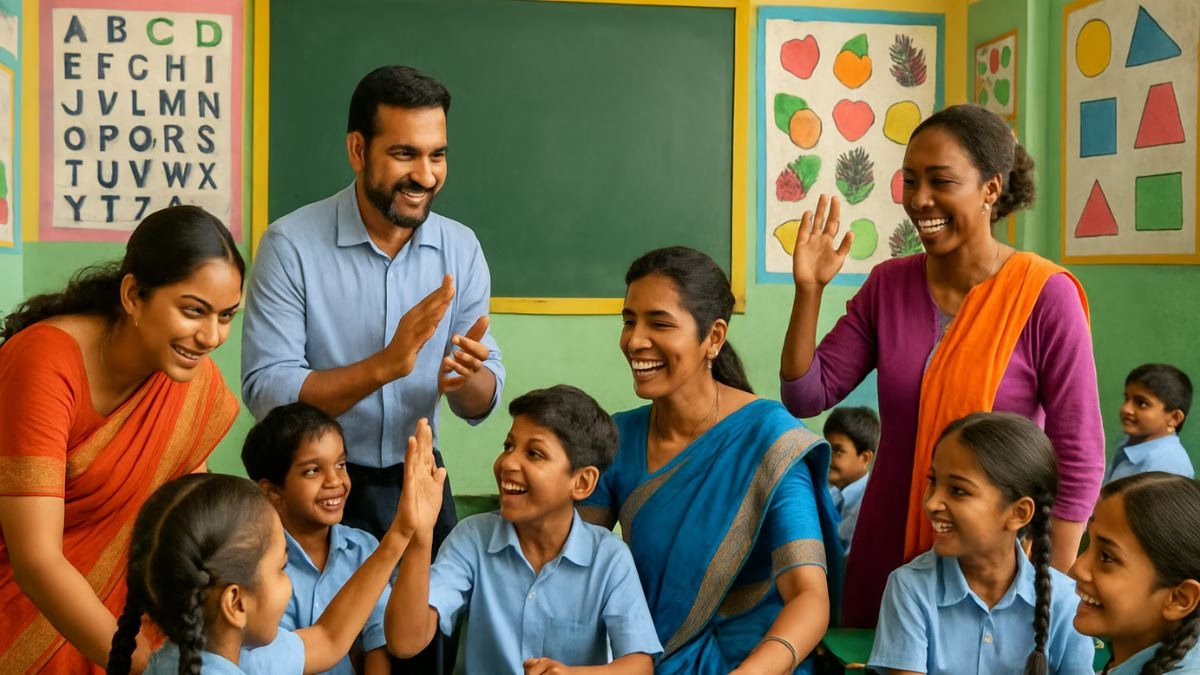
For the first time in India’s academic history, the total number of school teachers in the country has crossed the one crore mark in the academic year 2024-25. This milestone was highlighted in the Unified District Information System for Education Plus (UDISE+) report released by the Ministry of Education on school education.
According to the report, this represents a 6.7 percent increase in the teacher workforce compared to 2022-23. The data further reflects the scale of India’s education system, which now comprises nearly 15 lakh schools catering to over 24 crore students across the country.
The enrolment pattern shows that nearly 50 percent of students are studying in government schools, followed by 41 percent in private institutions, with the rest enrolled in government-aided schools. Encouragingly, female representation among teachers has risen to 54.3 percent, while girls’ enrolment has reached 48.3 percent.
Better student-teacher ratios and declining dropouts
One of the most significant improvements reported is in the Pupil-Teacher Ratio (PTR). At the foundational, preparatory, middle, and secondary levels, the ratios now stand at 10, 13, 17, and 21 respectively, showing marked progress in easing classroom loads for teachers.
The Ministry also reported steady gains in dropout rates, student retention, and Gross Enrolment Ratios, indicating that schools are doing more to support students and keep them in the education system. Special attention has also been given to phasing out zero-enrolment and single-teacher schools, with better infrastructure additions enhancing the overall schooling environment.
Highlighting the broader significance of these trends, the Education Ministry stated that the growing teacher workforce is a critical step in ensuring equitable access and quality in education. Increased teacher availability is expected to improve classroom engagement, reduce regional disparities, and help address learning gaps. Schools, the report noted, are now becoming “more supportive and responsive to students’ needs,” which has also contributed to a reduction in early dropouts and greater inclusivity.
With the teacher count crossing the one-crore landmark and school indicators showing a positive trajectory, the government emphasized that the coming years will focus on consolidating these gains and ensuring that every child in India has the opportunity to access quality education.
Currently, India’s school system serves around 24.7 crore students across approximately 14.7 lakh schools, aligning closely with official numbers but reflecting a slight decline in enrolment compared to previous years. The overall student enrolment in 2024-25 marks a seven-year low, falling by about 11 lakh students compared to 2023-24. This drop is notably pronounced at the primary level (classes 1 to 5), which alone saw a decline of roughly 34 lakh students from the previous academic year. Key states like Uttar Pradesh, Bihar, Rajasthan, West Bengal, and Maharashtra reported some of the steepest enrolment declines, contributing to this national trend.
Government schools now account for about 50 percent of enrolment, though some states have witnessed a significant shift of students from government to private schools. This shift has raised concerns about the government’s capacity to retain students in public schools, with efforts underway to address infrastructural and quality gaps.
On the positive side, there has been progress in girls’ education with girls’ enrolment hovering near 48 percent nationally. The Net Enrolment Ratio (NER) for girls at primary education stands at approximately 90 percent, indicating a high level of age-appropriate enrolment. The secondary and higher secondary levels have shown improvement as well, aligning with the National Education Policy’s target of universal enrolment by 2030.
EDUNEWS & VIEWS
India’s Dhirubhai Ambani School Ranked Among Top Global Highschools
Founded in 2003, India’s Dhirubhai Ambani International School is also one of the youngest schools to feature in the rankings.
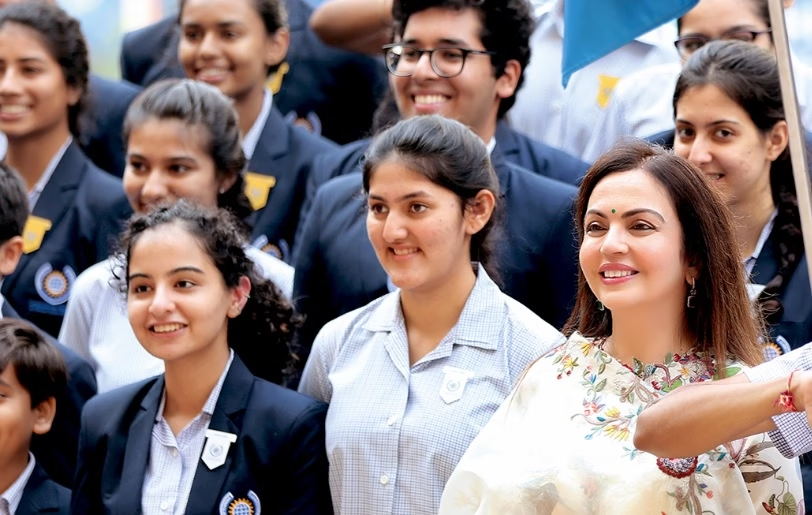
India’s Dhirubhai Ambani International School in Mumbai continues to shine on the global education stage, ranking fifth among schools outside the US and UK in the 2025 HSBC Hurun Education Global Highschools list. Founded in 2003, it is also one of the youngest schools to feature in the rankings.
The report emphasizes schools’ performance based on alumni university destinations, co-curricular development, and institutional reputation. With 190,000 students across the 180 ranked schools, only 0.6% of those listed are from India, underscoring the school’s elite standing.
In a media statement, Rupert Hoogewerf stated, “The list recognizes schools adding the most value to students’ futures. India’s presence through DAIS highlights the global competitiveness of select institutions in the country.”
Dhirubhai Ambani School joins a select group that includes Seoul International School, Chinese International School (HK), and Kolej Tuanku Ja’afar (Malaysia) in representing Asia outside China.
EDUNEWS & VIEWS
Global Highschool Rankings 2025: UK and US Dominate, China Rises
Among the standout institutions, Westminster School maintained its dominance with over 40% of graduates entering Oxbridge

In a global assessment of elite high schools, the HSBC Hurun Education Global High Schools 2025 report has named Westminster School in London as the world’s best high school for the third consecutive year. The annual ranking, now in its third edition, evaluates the top 180 independent schools across 11 countries based on university placements, co-curricular development, and institutional reputation.
The list reflects a shifting but still concentrated landscape of educational excellence. The United States and the United Kingdom together accounted for 85% of the world’s top highschools, with the US leading at 45% and the UK at 40%. However, China emerged as a strong contender, ranking third with 16 schools—up from 13 last year.
“The number of Chinese students studying abroad fell last year, but there are still nearly one million,” said Rupert Hoogewerf, Chairman and Chief Researcher of Hurun Education. “Interestingly, with 16 top-ranked highschools, Chinese families are finding viable options closer to home—avoiding time zone issues and maintaining cultural continuity.”
Among the standout institutions, Westminster School maintained its dominance with over 40% of graduates entering Oxbridge. St Paul’s School rose to second place, while The Dalton School in New York dropped to third. Notably, Winchester College returned to the top 10 and was named the world’s best boarding school, surpassing even Eton College and Phillips Andover.
“These rankings offer forward-looking insights for families planning their children’s international education,” said Kai Zhang, Head of International Wealth and Premier Banking, HSBC Asia, in a media statement. “Destinations like Hong Kong and Singapore are becoming increasingly attractive for their proximity and cultural alignment with Asian families.”
The report also revealed evolving trends in school environments and demographics:
>> 70% of the schools are co-educational, with a growing shift among historically boys-only UK schools admitting girls.
>> 51% offer boarding options, while half remain day schools.
>> The average school size was 1,050 students, with 140 graduating each year.
>> The average age of these schools is 204 years, with some—like King’s School, Canterbury—tracing roots back over a millennium.
Meanwhile, India’s Dhirubhai Ambani International School in Mumbai ranked 5th among schools outside the US and UK, continuing its position as a global outlier in quality private education from the subcontinent.
Despite steep tuition fees—averaging $63,000 annually for boarding schools—demand for places remains high. However, the UK’s recent addition of VAT on private school fees has prompted concerns, with schools like Winchester now costing over $80,000 per year.
Another key theme this year is the integration of creative thinking and AI literacy in education. “There is a real push toward STEAM, adding ‘Arts’ to STEM. Schools are under pressure to future-proof education and prepare students to thrive in the 2050s,” Hoogewerf added.
With data drawn from university destinations, co-curricular achievements, and alumni impact, the HSBC Hurun rankings offer more than a leaderboard—they reflect the evolving priorities and challenges in elite education worldwide.
-

 Space & Physics5 months ago
Space & Physics5 months agoIs Time Travel Possible? Exploring the Science Behind the Concept
-

 Earth6 months ago
Earth6 months ago122 Forests, 3.2 Million Trees: How One Man Built the World’s Largest Miyawaki Forest
-

 Space & Physics6 months ago
Space & Physics6 months agoDid JWST detect “signs of life” in an alien planet?
-
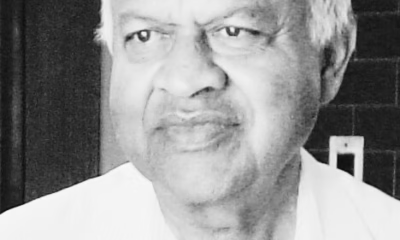
 Know The Scientist5 months ago
Know The Scientist5 months agoNarlikar – the rare Indian scientist who penned short stories
-

 Society4 months ago
Society4 months agoShukla is now India’s first astronaut in decades to visit outer space
-

 Society4 months ago
Society4 months agoAxiom-4 will see an Indian astronaut depart for outer space after 41 years
-

 Earth4 months ago
Earth4 months agoWorld Environment Day 2025: “Beating plastic pollution”
-

 Society6 months ago
Society6 months agoRabies, Bites, and Policy Gaps: One Woman’s Humane Fight for Kerala’s Stray Dogs












